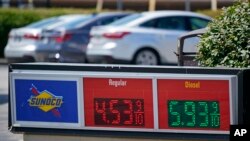The U.S. Federal Reserve's preferred inflation gauge, the personal consumption expenditures (PCE) price index, rose 6.8 percent compared to June 2021, the Commerce Department reported.
And inflation jumped 1.0 percent compared to May, in line with economists' expectations but outpacing personal income, which rose just 0.6 percent, the same increase as the prior month, according to the report.
Excluding the volatile food and energy components, the "core" PCE price index gained a more moderate 4.8 percent in the last 12 months, just a tenth higher than May but continuing a gradual slowing.
The Fed focuses on the PCE price index, as it reflects consumers' actual spending, including shifts to lower cost items, unlike the more well-known consumer price index, which jumped 9.1 percent in June.
The PCE also gives less weight to things like rent, vehicles and airline fares, which have contributed to the blistering pace of the CPI rise.
Consumers buoyed by a stockpile of savings during the pandemic splurged on goods, cars and homes last year, but global supply chain snarls and worker shortages pushed prices higher -- factors worsened by Russia's war on Ukraine, which sent food and energy prices soaring worldwide.
The Federal Reserve bankers face the difficult task of easing price pressures that are squeezing US households without causing a severe economic downturn.
One concern is that demands for higher pay amid a worker shortage could cause a wage-price spiral.
In a separate data report, the Labor Department said worker compensation, including wages and benefits, rose 1.3 percent in the three-months ended in June and up 5.1 percent in the latest 12 months.
Nancy Vanden Houten of Oxford Economics said the hotter-than-expected gain does not provide the compelling evidence of slowing inflation the central bank is seeking.
"The Q2 employment cost data doesn't provide any evidence that wage growth is slowing and leaves the Fed on track to lift the funds rate another 75bps at its September meeting," she said.
The inflation report comes right after the U.S. Commerce department reported that second quarter GDP slipped 0.9% after a 1.6% drop in 2022's first three months. While two consecutive down quarters traditionally signal a recession, analysts are mixed as to whether that is actually happening.
Some are using the term "stagflation" which was coined in the late 1970s when the economy was stagnant ("stag") during a time of inflation ("flation")





